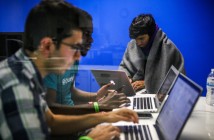By CLAIRE CAIN MILLER and CHI BIRMINGHAM

From employment to leisure and transportation to education, tech is changing the world at a faster pace than ever before. Already, people wear computers on their faces, robots scurry through factories and battlefields and driverless cars dot the highway that cuts through Silicon Valley. Almost two-thirds of Americans think technological change will lead to a better future, while about one-third think people’s lives will be worse as a result, according to a new survey from Pew Research Center. Regardless, expect more change. In a series of interviews, which have been condensed and edited, seven people who are driving this transformation provided a glimpse into the not-too-distant future.
What far-off technology will be commonplace in a decade?

“Phones and computers will automatically do anything tedious that doesn’t require brainpower, like signing up for a web site or app. The march of technology is the incessant march of convenience.”
EV WILLIAMS
“Fully immersive virtual reality.”
PETER THIEL
“Hundreds or thousands of drones flying to and fro for all kinds of reasons. Getting a top-end college education without going to a physical campus. Cars driven by computers instead of humans.”
MARC ANDREESSEN

“Implantable chips that monitor the number of steps we take, hours we sleep, all of our vital signs, blood chemistry and beyond. The chip data will be used to adjust our medications, offer suggestions to change our behavior and automatically send an ambulance — self-driving, of course.”
CLARA SHIH

“Personalized medicine. Imagine a unique drug that’s printed for you and your condition based on your individual gene sequencing.”
REID HOFFMAN

“Implantables, like a chip under your fingernail that unlocks all your devices.”
SEBASTIAN THRUN

Which industry will tech put out of business next?

“Drivers, auto mechanics, auto parts and auto insurance.”
CLARA SHIH
“Higher education. Diamond mining.”
EV WILLIAMS

“Consumer banking. Tech will unbundle banking for loans, payments, asset management and so on.”
REID HOFFMAN
“Airline pilots.”
SEBASTIAN THRUN
What technology will seem antiquated in a decade?

“Your charger. All of our devices should be able to wirelessly charge. Wireless power will also be a necessity in developing countries.”
SUSAN WOJCICKI
“Keys.”
SEBASTIAN THRUN
Smartphones. Instead, people will wear computers in the form of contact lenses, bracelets or clothing and “walk up to any wall and instantly have full access to all of your cloud data and services.”
MARC ANDREESSEN
“The computer mouse will be replaced. Think touch, swipe, rich hand gestures. Owning a car in an urban environment.”
REID HOFFMAN
“Email, computer keyboards, cash, handheld phones.”
CLARA SHIH
What is the next issue to undergo a sea change in social acceptance?
“Far more generalized acceptance of widespread variations in human behavior. All of us who were raised pre-Internet were taught that there is something called ‘normal,’ and I think that whole concept might go right out the window.”
MARC ANDREESSEN
“Ubiquitous video recording and surveillance.”
MARC ANDREESSEN
“Gender equality in leadership. Women are only 25-percent of the tech industry. As it grows in stature and wealth, women risk losing their influence in our society.”
SUSAN WOJCICKI
“Football. We realize it is very harmful for you, but we haven’t yet reached the tipping point where it becomes broadly unacceptable to condone.”
PETER THIEL
“We’ll reject factory animal farming.”
EV WILLIAMS
What is tech’s role in reducing income inequality?
“We’ll reject factory animal farming.”
EV WILLIAMS
What is tech’s role in reducing income inequality?
“Start new businesses that create jobs and solve real problems. Also, someone could create a Khan Academy that focuses on professional and vocational skills.”
REID HOFFMAN
“There is a bow wave of uncounted billions of dollars of philanthropic contributions that will unfold over the next 10 to 20 years from Silicon Valley.”
MARC ANDREESSEN
Claire Cain Miller writes about tech for The Upshot, a New York Times venture that presents news, analysis and graphics about politics and policy. Chi Birmingham is an illustrator.
Graphic by Jennifer Daniel and Shan Carter






